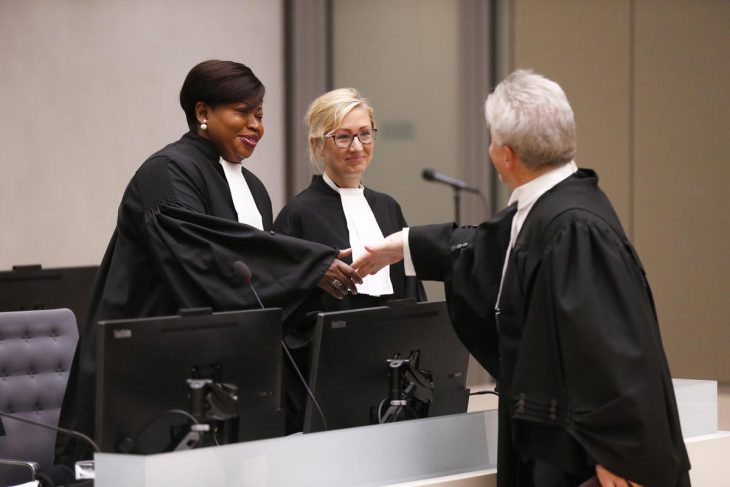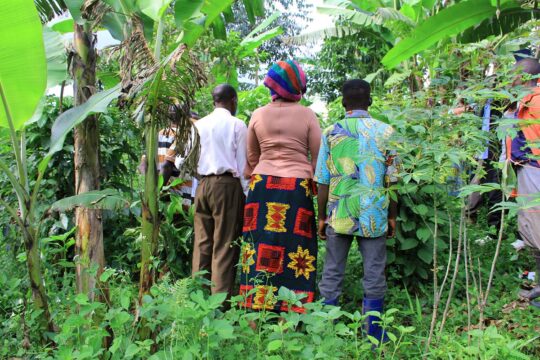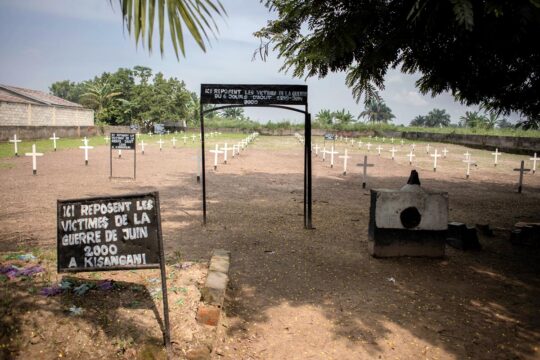The conviction of Congolese militia leader Bosco Ntaganda on all charges against him, including for rape of civilians and of fighters within his own troops, at the International Criminal Court (ICC) on July 8 was hailed as a milestone for prosecuting sexual violence and a victory for more inclusive charging.
In a rare sweeping win for ICC chief prosecutor Fatou Bensouda the three-judge panel unanimously ruled that Ntaganda, 45, was guilty of all 18 counts of war crimes and crimes against humanity he was charged with. In the summary of the judgement read out by presiding judge Robert Fremr, Ntaganda was described as a “key leader” of the Union Patriotique de Congo (UPC) militia whose contributions were central to a common plan to drive out all Lendu, an important ethnic group in Ituri, from certain locations in the Eastern part of Democratic Republic of Congo (DRC). “In addition to his direct orders to target and kill civilians, Mr Ntaganda endorsed criminal conduct of his soldiers by way of his own conduct,” the chamber said.
Sexual violence and the full range of atrocities
Ntaganda was found guilty of six different counts of rape and sexual slavery. The case made legal history as he became the first commander to be convicted for sexual violence and rape committed by his troops against members of the same force. The judges found that in addition to sexual violence against civilians it was “common practice” for female UPC members to be raped during their service and victims included at least three underage girls. “In the long road to accountability for sexual and gender-based crimes, [this day] was a turning point for the ICC”, Rosemary Grey from the University of Sydney Law School and Indira Rosenthal from the University of Tasmania wrote in a blog on the IntLawGrrls.com website.
Others observers stress that this case is also important for the ICC if you look at the scope of the charges. In earlier DRC cases before the ICC the prosecutor was widely criticized for charging very narrowly. “Many times I ran into victims and witnesses in Congo who were very surprised by the minimal convictions, for example against Thomas Lubanga who was only charged with recruitment of child soldiers,” human rights activist Anneke van Woudenberg, who documented Ntaganda’s crimes for Human Rights Watch since 2003, interviewed him twice about alleged human rights violations and was a prosecution witness at his ICC trial, told JusticeInfo. In another Congo case against Germain Katanga only one massacre was charged. Jean-Pierre Bemba, a Congolese politician and militia leader, was not charged for any crime of his troops in the DRC but only went on trial for atrocities committed in neighbouring Central African Republic where his militia only operated for a limited time.
This case has finally represented the full range of experiences of Congolese victims and the full range of the brutalities they have endured and that is what makes this case important
“If you look at the other trials of Congolese before the ICC, this one was different because it went across multiple incidents and covered multiple crimes,” Van Woudenberg said. “This case has finally represented the full range of experiences of Congolese victims and the full range of the brutalities they have endured and that is what makes this case important,” according to Van Woudenberg.
Satisfaction and concern in Ituri
"We are pleased to see Bosco Ntaganda being found guilty of the crimes committed in Ituri,” said Xavier Maki, coordinator of the human rights organization Justice Plus, based in Bunia, capital of the Ituri province. “This is what victims and communities have been waiting for a long time. We are waiting for a significant sentence to be imposed, and for reparations to be decided in favor of the civilians who have suffered these atrocities. We would like reparations be collective, because these crimes have not only affected individuals, but also and above all the whole community. We also consider this verdict to be a warning against the instigators of inter-community violence in Ituri. This strong signal from the International Criminal Court may deter those who want to prevent the old inter-ethnic conflict from ending, and this may thus contribute to the reduction of tensions, and consequently to pacification."
Considering the ongoing conflict, we are tempted to believe that the Court has only prosecuted small fry and spared the big fish that instigated these crimes.
Lawyer Jean Bosco Lalo, president of Ituri civil society also expressed satisfaction but seemed far less convinced about the deterrence power of such verdict. “One thing worries us: despite the prosecution and sanctions against Thomas Lubanga, Germain Katanga, Mathieu Ngudjolo, and now Bosco Ntaganda, presented as the perpetrators of past crimes in Ituri, the situation on the ground is not improving,” he warned. “The war and growing insecurity remain. Since 2018, we have still experienced serious inter-community violence in Ituri, particularly in the Djugu region. We believe that there are real perpetrators of crimes who are still on the run and are free to take any action. The Court should not be satisfied with the work done so far. It must go further, to the point of dismantling all the networks of manipulators and intellectual authors in order to help pacify Ituri. Considering the ongoing conflict, we are tempted to believe that the Court has only prosecuted small fry and spared the big fish that instigated these crimes.”
The clouds ahead
There is no sentence yet in the case as the ICC procedure calls for a special hearing to discuss punishment. There are no fixed time limits for such a procedure but in previous cases it took around three months between conviction and a sentence being handed down. And that will likely not be the end of the case. While the prosecution might relish its first major victory after the acquittal of former Ivory Coast president Laurent Gbagbo and his “street general” Charles Blé Goudé in January, the Ntaganda defence is almost certain to lodge an appeal.
One of the grounds that will likely be raised is the controversy around Judge Kuniko Ozaki of Japan who was one of the judges to convict Ntaganda. In May this year the defence already filed a request to disqualify her as she briefly held a dual role after she was appointed as Japanese ambassador to Estonia while still serving on the Ntaganda bench. After her ambassador’s job was targeted by the defence, Ozaki resigned her post. The defence insisted her appearance of judicial independence and impartiality was compromised. They also argued she could be biased against Ntaganda as he was the reason she had to give up her diplomatic post. (A plenary of judges convened in June declined to disqualify her.)
Ntaganda’s counsel Stephane Bourgon will also likely try to show on appeal, as he did during the trial, that his client did take steps to prevent atrocities and punish perpetrators. In the meantime, the ICC Office of the prosecutor can enjoy a rare success.





